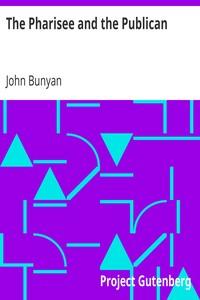Read this ebook for free! No credit card needed, absolutely nothing to pay.
Words: 60136 in 13 pages
This is an ebook sharing website. You can read the uploaded ebooks for free here. No credit cards needed, nothing to pay. If you want to own a digital copy of the ebook, or want to read offline with your favorite ebook-reader, then you can choose to buy and download the ebook.


: The Pharisee and the Publican by Bunyan John - Pharisee and the publican (Parable) Early works to 1800
THE PHARISEE AND THE PUBLICAN.
IN the beginning of this chapter you read of the reason of the parable of the unjust judge and the poor widow; namely, to encourage men to pray. "He spake a parable to this end, that men ought always to pray, and not to faint;" and a most sweet parable for that purpose it is: for if through importunity, a poor widow woman may prevail with an unjust judge, and so consequently with an unmerciful and hard-hearted tyrant, how much more shall the poor, afflicted, distressed, and tempted people of God, prevail with, and obtain mercy at the hands of, a loving, just, and merciful God? The unjust judge would not hearken to, nor regard the cry of, the poor widow, for a while: "But afterward he said within himself, Though I fear not God, nor regard man; yet because this widow troubleth me, I will avenge her, lest by her continual coming she weary me." "Hark," saith Christ, "what the unjust judge saith." "And shall not God avenge his own elect, which cry day and night unto him?--I tell you that he will avenge them speedily."
This is therefore a very comfortable parable to such of the saints as are under hard usage by reason of evil men, their might and tyranny: for by it we are taught to believe and expect, that God, though for a while he seemeth not to regard, yet will, in due time and season, arise and set such in safety from them that puff at them; Psalm xii. 4.
Let the good Christian pray always; let him pray, and not faint at seeming delays; for if the widow by importunity prevailed with the unjust judge, how much more shall he with his heavenly Father. "I tell you," says Christ, "that he will avenge them speedily."
But now, forasmuch as this parable reacheth not the poor Publican in the text, therefore our Lord begins again, and adds to that other parable, this parable which I have chosen for my text; by which he designeth two things: First, The conviction of the proud and self-conceited Pharisee: Secondly, The raising up and healing of the cast down and dejected Publican. And observe it, as by the first parable he chiefly designeth the relief of those that are under the hands of cruel tyrants, so by this he designeth the relief of those that lie under the load and burden of a guilty and disquieted conscience.
This therefore is a parable that is full of singular comfort to such of the sinners in the world that are clogged with guilt and sense of sin; and that lie under the apprehensions of, and that are driven to God by the sense of the judgment that for sin is due unto them.
In my handling of this text, I shall have respect to these things--
Men must not be judged, or justified, according to what themselves do think, but according to the verdict and sentence that cometh out of the mouth of God about them. Now, the sentence of God is, "All have sinned:" "There is none righteous, no, not one;" Rom. iii. It is no matter, then, what the Pharisee did think of himself; God by his word hath proclaimed him a sinner: a sinner, by reason of original sin; a sinner, by reason of actual transgression. Personally, therefore, with reference to the true nature of their state, they both were sinners, and both by the law under condemnation. True, the Publican's leprosy was outward; but the Pharisee's leprosy was inward: his heart, his soul, his spirit, was as foul, and had as much the plague of sin, as had the other in his life or conversation.
Indeed the Publican is here found to recant, and repent of his condition, and of the condition that he had put himself into; and the Pharisee to boast of his. But the Publican's repentance was not of himself, but of God, who can also, yea, and sometimes it is evident he doth, make Pharisees also repent of that condition that they have chosen to be in themselves; Phil. iii. 3-8. The Pharisee, therefore, in commending of himself, makes himself never the better; the Publican also, in condemning of himself, makes himself never the worse. Nay, contrariwise, the Pharisee, by commending of himself, makes himself much the worse, ver. 14; and the Publican, by condemning of himself, makes himself much the better. "I tell you this man went down to his house justified rather than the other; for every one that exalteth himself shall be abased: and he that humbleth himself shall be exalted."
But, I say, as to men's commending of themselves, yea, though others should commend them also, that availeth, to God-ward, nothing at all. "For not he that commendeth himself is approved, but whom the Lord commendeth." So then, men in "measuring themselves by themselves, and comparing themselves among themselves, are not wise;" 2 Cor. x. 12.
Now, this was the way of the Pharisee; I am not, saith he, as other men: I am no extortioner, nor unjust, no adulterer, nor yet as this Publican.
"Two men went up into the temple to pray;" and they two, as I said, as opposite one to the other, as any two men that ever went thither to pray. One of them was over righteous, and the other wicked over much. Some would have thought, had they not by the word of Christ been otherwise described, that they had been both of the same religion; for they both went up into the temple to pray; yea, both to pray, and that at the same time, as if they did it by appointment, by agreement; but there was no such thing. The one was a Pharisee, the other a Publican: for so saith the after words: and therefore persons as opposite as light and darkness, as fire and water; I mean, as to their apprehensions one of another. The Pharisee could not abide the Publican, nor could the Publican brook the Pharisee; and yet both went up into the temple to pray. It is strange to see, and yet it is seen, that men cross in their minds, cross in their principles, cross in their apprehensions; yea, and cross in their prayers too, should yet meet together in the temple to pray.
Free books android app tbrJar TBR JAR Read Free books online gutenberg
More posts by @FreeBooks

: How He Lied to Her Husband by Shaw Bernard - English drama (Comedy); Marriage Drama; Triangles (Interpersonal relations) Drama; London (England) Drama One Act Plays


: Heartbreak House by Shaw Bernard - World War 1914-1918 Drama; Upper class England Drama; England Social life and customs 20th century Drama


: La Mere Bauche From Tales of All Countries by Trollope Anthony - Short stories; Mate selection Fiction; France Fiction



